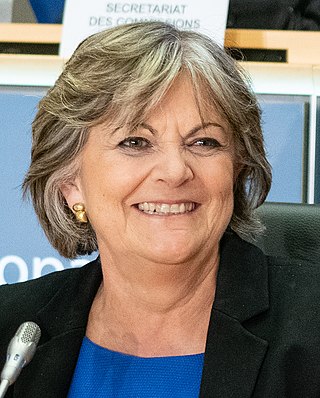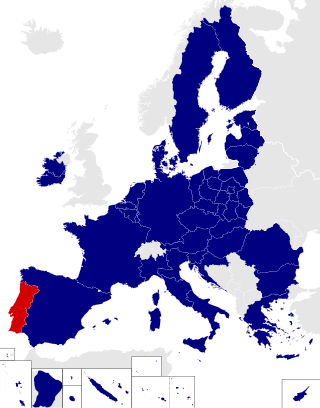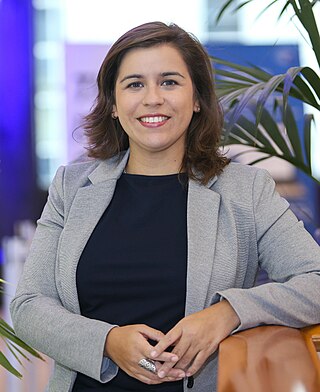| Members of the European Parliament for Portugal |
|---|
This is a list of the 24 members of the European Parliament for Portugal in the 1989 to 1994 session.

Politics in Portugal operates as a unitary multi-party semi-presidential representative democratic republic, whereby the Prime Minister of Portugal is the head of government, and the President of Portugal is the non-executive head of state with several significant political powers they exercise often. Executive power is exercised by the Government, whose leader is the Prime Minister. Legislative power is primarily vested in the Assembly of the Republic, although the government is also able to legislate on certain matters. The Judiciary of Portugal is independent of the executive and the legislature. The President exerts a sort of "moderating power", not easily classified into any of the traditional three branches of government.

The Socialist Party is a social-democratic political party in Portugal. It was founded on 19 April 1973 in the German city of Bad Münstereifel by militants who were at the time with the Portuguese Socialist Action. The PS is a member of the Socialist International, Progressive Alliance and Party of European Socialists, and has nine members in the European Parliament within the Progressive Alliance of Socialists and Democrats group during the 9th European Parliament. It has been the governing party of Portugal since the 2022 legislative election.

The Assembly of the Republic, commonly referred to as simply Parliament, is the unicameral parliament of Portugal. According to the Constitution of Portugal, the parliament "is the representative assembly of all Portuguese citizens". The constitution names the assembly as one of the country's organs of supreme authority.

Elections in Portugal are free, fair, and regularly held, in accordance with election law.

Elisa Maria da Costa Guimarães Ferreira, GCC is a Portuguese politician and economist who has been serving as European Commissioner for Cohesion and Reforms in the administration of President Ursula von der Leyen since 2019. She previously served as vice-governor of the Bank of Portugal from 2016 until 2019. She was as Member of the European Parliament (MEP) for the Socialist Party; part of the Party of European Socialists between 2004 and 2016. In 2019, she was selected by Portugal to serve as a European Commissioner.

The 1994 European Parliament election in Portugal was the election of MEP representing Portugal constituency for the 1994-1999 term of the European Parliament. It was part of the wider 1994 European election. In Portugal the election was held on 12 June.

The 1989 European Parliament election in Portugal was the election of MEP representing Portugal constituency for the 1989-1994 term of the European Parliament. It was part of the wider 1989 European election. In Portugal the election was held on 18 June.
The 1987 European Parliament election in Portugal took place on 19 July 1987. It was the election of all 24 MEPs representing the Portugal constituency for the remainder of the 1984–1989 term of the European Parliament. Portugal had acceded to the European Community on 1 January 1986 and had been represented in the European Parliament by 24 appointed delegates until elections could be held. These elections took place on the same day of the legislative elections of 1987.
The Democratic Renewal Party was a political party in Portugal, founded in 1985 with the political support of the then independent President of the Republic, Ramalho Eanes, and lasting until 2000. At the time of its foundation, it was meant to "moralize Portuguese political life" and the party positioned itself in the political centre. Its first leader was Hermínio Martinho.

The 1989 European Parliament election was a held on June Wednesday 15 to Sunday 18 across the 12 European Union member state in June 1989. It was the third European Parliament election but the first time that Spain and Portugal voted at the same time as the other members they joined in 1986. Overall turnout dropped to 59%.

Between 1973 and 1993 the European Communities saw the first enlargement of the Communities. On 1 January 1973, Denmark, Ireland, and the United Kingdom became the first countries to join the Communities. The détente allowed initiation of the reunification of the continent through establishing the Conference on Security and Co-operation in Europe. Greece was the next to join EC on 1 January 1981, followed by Spain and Portugal joining on 1 January 1988, while Turkey has initiated the procedure in 1987. Upon the fall of the Iron Curtain, the CSCE was transformed in 1990 into Organization for Security and Co-operation in Europe, the Communities enlarged for a fourth time through the German reunification, while other former communist European countries stated their firm commitment to join, prompting formulation of the Copenhagen criteria. This period was, however, also the one which witnessed the first voluntary exit from the Communities, namely the one of Greenland in 1985. The integration progressed under the Delors Commission resulting in the creation of the European Union in 1993.

Portugal is a European Parliament constituency for elections in the European Union covering the member state of Portugal. It is currently represented by twenty-one Members of the European Parliament.
The 2009 European Parliament election in Portugal was the election of the delegation from Portugal to the European Parliament held on 7 June 2009.
Left Unity was a communist political group with seats in the European Parliament between 1989 and 1994.

The 2014 European Parliament election in Portugal elected the Portuguese delegation to the European Parliament from 2014 to 2019. This was the seventh European Parliament election held in Portugal. The elections were held on Sunday, 25 May 2014.
Events in the year 1989 in Portugal.

This is the results breakdown of the European Parliament election held in Spain on 15 June 1989. The following tables show detailed results in each of the country's 17 autonomous communities and in the autonomous cities of Ceuta and Melilla.

Sara Cerdas is a Portuguese medical doctor and politician who serving as a Member of the European Parliament for the Socialist Party.